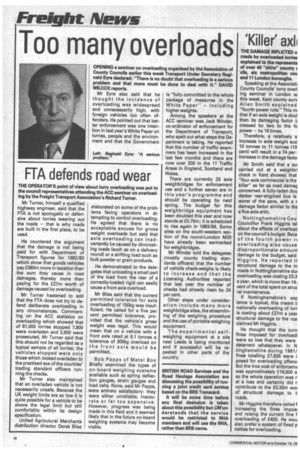FTA defends road wear
Page 10

If you've noticed an error in this article please click here to report it so we can fix it.
THE OPERATOR'S point of view about lorry overloading was put to the council representatives attending the ACC seminar on overloading by the Freight Transport Association's Richard Turner.
Mr Turnec, himself a qualified highway engineer, said that the FTA is not apologetic or defensive about lorries wearing out the roads — that is why roads are built in the first place, to be used.
He countered the argument that the damage is not being paid for with Department of Transport figures for 1982/83 which show that goods vehicles pay £360m more in taxation than the sum they cause in road damages, thereby more than paying for the £27m worth of damage caused by overloading.
Mr Turner hastened to add that the FTA does not try to defend deliberate overloading in any circumstances. Commenting on the ACC statistics on overloading which showed that of 81,000 lorries stopped 7,800 were overladen and 2,600 were prosecuted, Mr Turner said that this should not be regarded as a typical sample of all lorries; the vehicles stopped were only those which looked overladen to the practised eye of the counties' trading standard officers running the checks.
Mr Turner also maintained that an overladen vehicle is not necessarily unsafe. Because the UK weight limits are so low it is quite possible for a vehicle to be above the legal limit but still comfortably within its design specification.
United Agricutural Merchants distribution director Derek Bliss elaborated on some of the problems facing operators in attempting to control overloading. He agreed that there is no acceptable excuse for gross weight overloads but said that axle overloading can inadvertently be caused by diminishing loads (such as on a delivery round) or a shifting load such as bulk powder or grain products.
He demonstrated to the delegates that unloading a small part of the load from the rear of a correctly-loaded rigid can easily cause a front axle overload.
Mr Bliss said that the current permitted tolerance for axle overloading of 150kg was insufficient. He called for a five per cent permitted tolerance, provided that the vehicle's gross weight was legal. This would mean that on a vehicle with a front axle rated at 6.1 tonnes a tolerance of 305kg overload on the front axle would be permitted.
Bob Papps of Metal Box Briefly examined the types of on-board weighing systems available such as spring deflection gauges, strain gauges and load cells. None, said Mr Papps, were entirely satisfactory: they Were either unreliable, inaccurate or far too expensive. However, progress was being made in this field and it seemed likely that in the future on-board weighing systems may become viable.




















































































